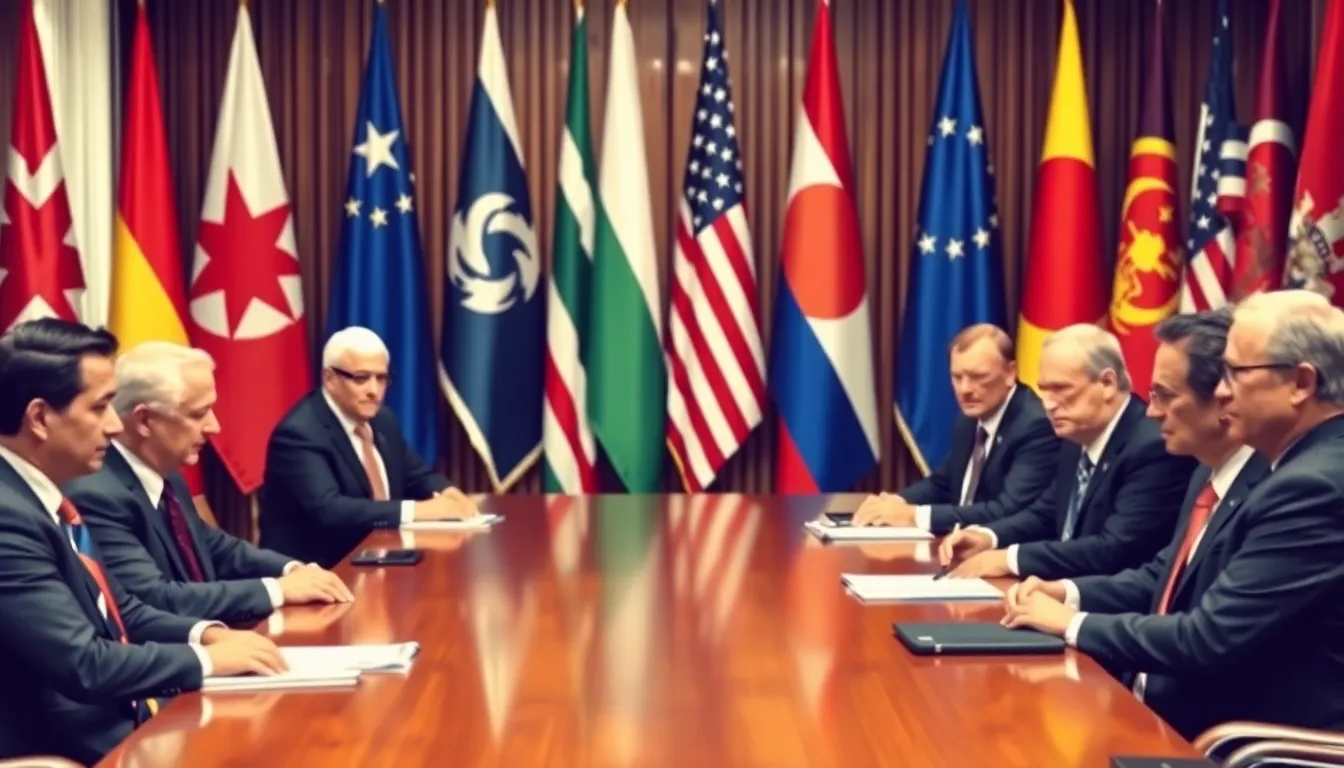Table of Contents
ToggleWhen countries clash, they often turn to economic sanctions like a kid throwing a tantrum in the candy aisle. Instead of a timeout, they impose trade restrictions, freezing assets, and cutting off access to crucial resources. But what’s the real impact of these economic time-outs? Are they just a way to flex political muscle, or do they genuinely bring about change?
As nations wield sanctions like a double-edged sword, the consequences ripple through economies and everyday lives. While some argue they’re necessary to curb aggressive behavior, others question their effectiveness, pointing out that they often hurt the very people they’re meant to help. Dive into the world of economic sanctions, where the stakes are high, and the outcomes can be as unpredictable as a cat on a hot tin roof.
Overview of Economic Sanctions
Economic sanctions serve as tools used by governments to influence the behavior of other nations or entities. These measures encompass various restrictions, including trade barriers, financial constraints, and asset freezes. The primary goal focuses on coercion, making it difficult for targeted countries to engage in international commerce.
Governments often implement sanctions in response to conflicts, human rights violations, or aggressive military actions. Targeted sanctions aim at specific individuals or organizations, minimizing broader economic harm to civilian populations. Such measures often reflect a nation’s efforts to uphold international norms and values.
The effectiveness of economic sanctions remains a topic of debate among scholars and policymakers. Historical instances show mixed results, where some sanctions have successfully pressured governments to change policies while others have failed to achieve their intended outcomes. For example, the sanctions imposed on South Africa during apartheid significantly contributed to policy changes. Conversely, sanctions against North Korea have continued for decades with minimal positive results.
Adverse effects frequently emerge as unintended consequences of these measures. Economic hardships often fall more heavily on ordinary citizens than on the political elites the sanctions aim to penalize. Consequently, such hardships can lead to humanitarian crises, further complicating the political landscape.
International cooperation frequently enhances the impact of sanctions. When multiple countries unite in imposing sanctions, the collective pressure on a targeted regime increases significantly. However, unilateral sanctions may lead to limited efficacy, as targeted nations can seek alternative partnerships to mitigate the impact.
Economic sanctions represent a nuanced approach to foreign policy. They hold potential as tools for change and deterrence but carry intrinsic risks that can exacerbate humanitarian challenges.
Types of Economic Sanctions

Economic sanctions come in various forms, primarily categorized into unilateral and multilateral sanctions, each serving specific diplomatic purposes.
Unilateral Sanctions
Unilateral sanctions involve measures imposed by one country against another without international consensus. They often target trade, financial transactions, and specific individuals or entities. The United States frequently employs unilateral sanctions to exert pressure, often citing national security interests. Examples include sanctions against Iran due to its nuclear program. These actions can create economic isolation for the target nation. However, they sometimes provoke backlash, leading to strained diplomatic relations and limited effectiveness in achieving broader goals.
Multilateral Sanctions
Multilateral sanctions occur when multiple countries collectively impose restrictions, often through organizations like the United Nations. These sanctions typically carry more weight due to the consensus among nations. An instance of effective multilateral sanctions is the international response to North Korea’s nuclear tests. Such agreements aim to unify pressure on the targeted state. The coordination among nations enhances credibility and can lead to a more significant impact. Furthermore, multilateral sanctions often mitigate the risks of unintended humanitarian consequences, as they reflect a collective stance against specific actions.
Impacts of Economic Sanctions
Economic sanctions create significant repercussions for both targeted nations and the global community. Analysis shows that the consequences extend beyond mere political statements, affecting economies and social structures profoundly.
Economic Consequences
Economic sanctions often result in reduced GDP growth for targeted countries. A 2019 study indicates that sanctions can lead to a decline of up to 10% in GDP within a few years of implementation. Trade barriers also disrupt import and export activities, significantly decreasing foreign investments, as seen in the aftermath of U.S. sanctions on Iran. Financial constraints lead to currency devaluation and inflation, escalating costs for basic goods. Such economic instability further affects job availability, causing increased unemployment rates. Consequently, the burden of these sanctions typically falls on everyday citizens, worsening their economic conditions.
Social Consequences
Socially, economic sanctions adversely impact public health and education systems. Shortages in essential goods often emerge, making everyday necessities like food and medicine hard to obtain. Reports indicate that infants and elderly populations typically face heightened health risks due to these shortages. Access to education declines, as economic hardships force families to prioritize survival over schooling. Large-scale social discontent can emerge when citizens experience declining living standards, leading to protests and political unrest. Local communities often become fragmented, facing challenges in maintaining social cohesion as resources dwindles.
Case Studies of Economic Sanctions
Economic sanctions serve as significant tools in international relations. They aim to alter the behavior of targeted nations, often with mixed results.
Recent Examples
Recent sanctions against Russia illustrate the impact of collective international action. Following the invasion of Ukraine, over 30 countries imposed economic restrictions on Russia, including asset freezes and trade barriers. This coordinated effort contributed to a notable decline in the value of the Russian ruble and reduced foreign investments. Another instance involves U.S. sanctions on Venezuela, targeting oil exports in response to human rights violations. These measures led to a sharp drop in Venezuela’s oil production, exacerbating existing economic crises.
Historical Context
Historically, sanctions have played roles in various conflicts with varying effectiveness. Sanctions against Iraq in the 1990s aimed to compel compliance with UN resolutions after the Gulf War. While these measures limited Iraq’s oil revenues, they also resulted in humanitarian crises and widespread suffering among civilians. In contrast, sanctions during South Africa’s apartheid regime successfully pressured the government to dismantle discriminatory practices. These historical examples demonstrate how the context and implementation of sanctions significantly affect outcomes and public welfare.
Economic sanctions remain a contentious tool in international relations. While they aim to influence behavior and promote change, their effectiveness often varies widely. The unintended consequences can inflict severe hardships on civilian populations rather than the intended political targets.
The success of sanctions hinges on factors like international cooperation and the specific context in which they are applied. As global dynamics shift, understanding the complexities of economic sanctions becomes crucial for policymakers. Navigating this multifaceted landscape requires a careful balance between achieving foreign policy goals and minimizing humanitarian impacts. Ultimately, the debate over the use of sanctions will continue as nations grapple with their moral and practical implications.




